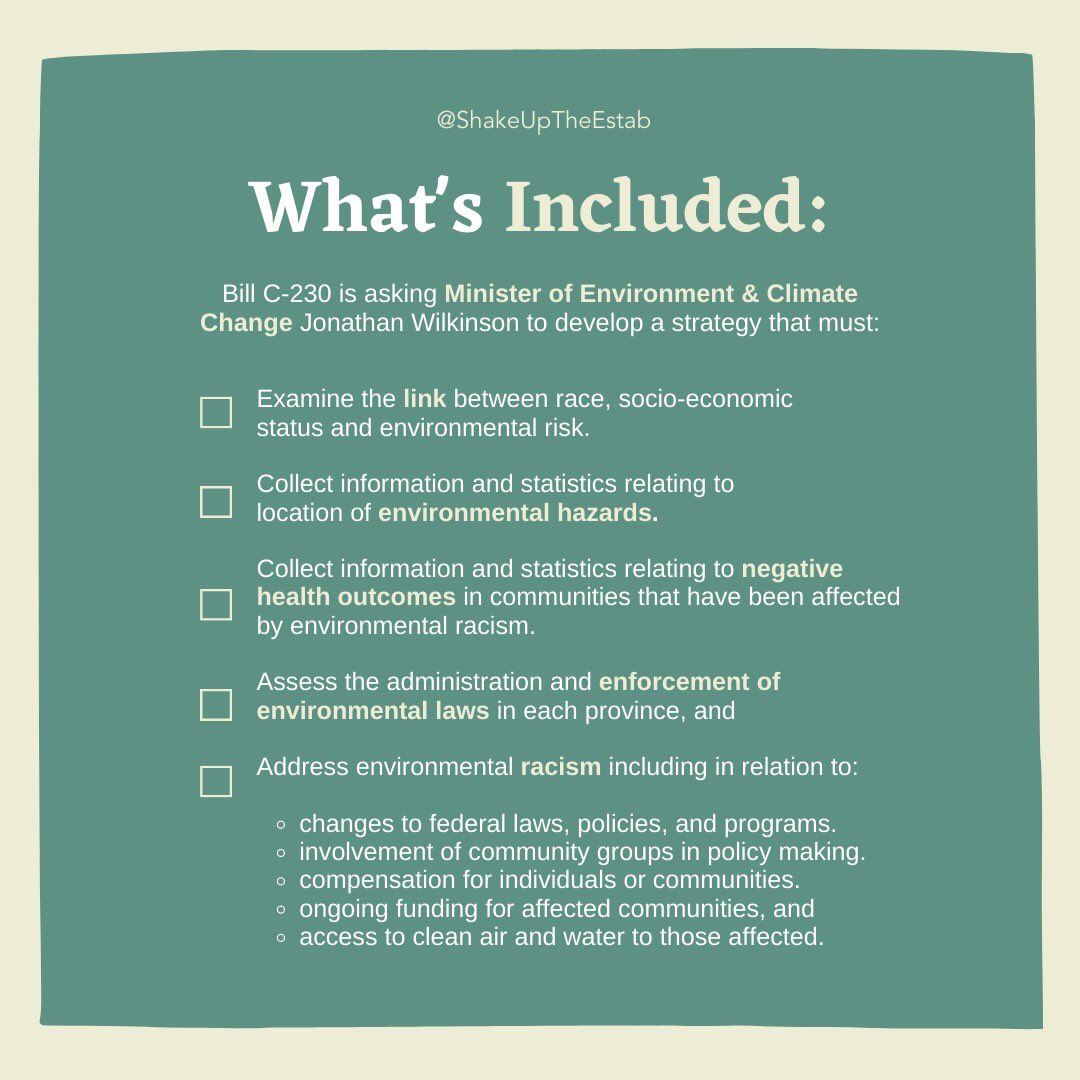Due to its systemic nature, environmental racism has long been built into colonial policies and proceedings. Therefore, it is important to learn about and support new legislations that seek to dismantle systemic racism. The following are a few of the relevant policies that address environmental justice and racism in the country now known as Canada.
Bill C-230: National Strategy to Redress Environmental Racism Act
Bill C-230 aims to require the Minister of Environment and Climate Change to develop a strategy that:
- Assesses the relationship between race, socio-economic status, and risk of exposure to environmental hazards
- Collects data on the locations and negative health impacts of environmental racism in affected communities
- Assesses the implementation and enforcement of current environmental laws
- Recognizes the impacts of environmental racism and the need for:
- Updating current laws, policies, and programs
- Involving impacted communities and
- Compensation and funding for impacted communities
This bill is crucial for the environmental justice movement because it would be one of the first major legislations to acknowledge the real and harmful impacts of environmental racism. It would ensure that data is collected and then used as evidence to develop new programs and policies working towards environmental justice.
Bill C-230 is still undergoing the process of approval.
Bill C-28: Strengthening Environmental Protection for a Healthier Canada Act
Bill C-28 aims to update the Canadian Environmental Protection Act (CEPA).
CEPA is one of Canada’s primary legislations “aimed at preventing pollution and protecting the environment and human health.” It outlines processes for pollution reduction by regulating industrial toxic waste disposal and vehicle emissions.
CEPA was last updated more than 20 years ago in 1999. Therefore, Bill C-28 has become essential in the movement for environmental justice. Specifically, this bill would update CEPA to:
- Recognize that all Canadians have the right to a healthy environment and
- Recognize and assess how toxicants disproportionately affect vulnerable populations, such as Indigenous communities
Bill C-28 is still undergoing the process of approval.
Bill C-15: United Nations Declaration on the Rights of Indigenous Peoples Act
Bill C-15 aims to implement the 46 articles set out in the United Nations Declaration on the Rights of Indigenous Peoples (UNDRIP; right).
UNDRIP was developed in 2007 by the UN General Assembly in consultation with Indigenous leaders from around the world. This declaration “affirms and sets out a broad range of collective and individual rights that constitute the minimum standards to protect the rights of Indigenous Peoples and to contribute to their survival, dignity and well-being.”
These include rights to:
- Lands, territories and resources
- Culture and language
- Environment
- Health
- Indigenous institutions and legal systems
- Education
- and more
The implementation of these rights outlined in UNDRIP is critical to work towards environmental justice and reconciliation processes. UNDRIP serves as a fundamental framework to help assess Canadian laws and create an action plan to address systemic racism.
“Indigenous peoples have the right to the conservation and protection of the environment and the productive capacity of their lands or territories and resources. States shall establish and implement assistance programmes for indigenous peoples for such conservation and protection, without discrimination.”
UNDRIP, Article 24
Bill C-15 was passed on June 21, 2021. Over the next two years, the Canadian government will collaboratively create an action plan with input from Indigenous communities.
Sources
- https://www.canada.ca/en/environment-climate-change/news/2021/04/government-of-canada-delivers-on-commitment-to-strengthen-the-canadian-environmental-protection-act-1999-and-proposes-to-recognize-a-right-to-a-hea.html
- https://www.canada.ca/en/environment-climate-change/services/canadian-environmental-protection-act-registry/general-information/overview.html
- https://www.enrichproject.org/billc-230/
- https://environmentaldefence.ca/2019/11/18/indigenous-rights-part-climate-action-questions-undrip/
- https://www.justice.gc.ca/eng/declaration/what-quoi.html
- https://www.parl.ca/LegisInfo/en/bill/43-2/C-230
- https://www.parl.ca/LegisInfo/en/bill/43-2/c-28
- https://www.parl.ca/LegisInfo/en/bill/43-2/C-15




